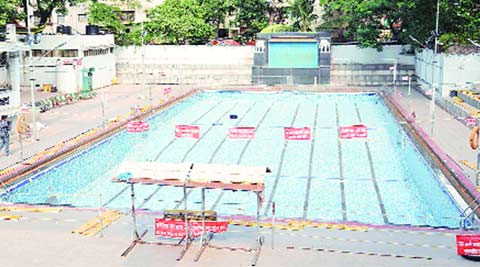Pune: Pools closed, professional swimmers high and dry
For professional swimmers, the water needs to be changed frequently to maintain good swimming conditions and showers need to be operational.

Citing the water scarcity because of insufficient rainfall, the PMC on Sunday sent a notice to all swimming pools in the city to shut down temporarily. Though the decision will save water effectively, it will affect professional swimmers who are in the midst of preparations for university and national tournaments to be played in October.
For professional swimmers, the water needs to be changed frequently to maintain good swimming conditions and showers need to be operational. Without either of them, training can’t take place. The players and coaches are hoping for rainfall which would bring training schedules back on track.
[related-post]
“The water cut they implemented last year lasted only for a week; the situation has actually deteriorated this year. In the worst case scenario, any swimming pool uses old water for two to three weeks by chlorinating and bleaching it several times. It is done to prevent the outspread of infectious diseases. However, it affects the player’s breathing pattern, which makes them tired early, and overall health. Excess chlorine causes skin irritation,” said Raghurai Kulkarni, a swimmer who has participated in 16 national swimming tournaments.
Kulkarni, a bachelor of computer science also stressed the importance of pre-training and post-training shower. “Pre-training shower is a hygienic practice, where you clean yourself before stepping into the pool, while post-training shower is required to cool yourself down after intense exercise,” he said.
Among the aquatic sports, a game that comes on par with swimming is water polo. Anshul Yerwadekar, a third year student of architecture and national level player of water polo said that water cuts would affect the practice of the team sport. “The authorities are saying that two swimming pools will remain open; which are presumably Tilak tank at Deccan and SP College swimming pool. I’m currently training at Chaitanya swimming pool, but if it closes down, I’ll have to go to one of these pools. The rush at these pools will increase, making it impossible to practice. Our coach gives us a target of certain hours of training in a week and if they’re not met, it affects performance,” says Yerwadekar.
According to coach Manoj Erande, who received the state government’s Shiv Chhatrapati Award for coaching in 2009, the alternative to this crisis is opting for a swimming pool like Old Tilak tank which is fed by natural streams; however the possibility of it being available to anyone else except its old members is low. In a district meet by Maharashtra State Amateur Aquatic Association, the decision was taken to hold the state level tournament in Amravati from September 26 to 30.
“If we go by those dates, the coming days are crucial for practice. Many tanks are dependent on PMC as they don’t have borewell. With evaporation and daily activity, the water level reduces by 1 feet every day. If the supply is stopped, we have no option other than canceling practice sessions.”